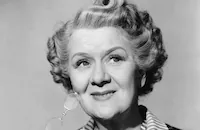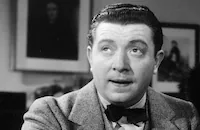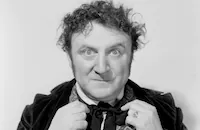Blessed Event

Brief Synopsis
Cast & Crew
Roy Del Ruth
Lee Tracy
Mary Brian
Allen Jenkins
Ruth Donnelly
Ned Sparks
Film Details
Technical Specs

Synopsis
While his boss is on vacation, reporter Alvin Roberts has been writing a snappy gossip column featuring announcements of "blessed events," impending births of both the married and unmarried. Although the column is not very respectable, circulation jumps, so Alvin is assigned a regular position. Soon, he is so powerful that gangster Sam Goebel sends his gunman, Frankie Wells, to threaten him. Instead, Alvin tricks Frankie into confessing to murder and records it on his dictaphone. He warns Frankie that if someone kills him, Frankie will be executed painfully. Alvin's nemesis, singer Bunny Harmon, is opening a new nightclub and vows that Alvin will not be admitted, ever. Alvin, on the other hand, insists that he will be there no matter what. When singer Dorothy Lane begs Alvin, who has no scruples when it comes to his column, not to print the news that she is pregnant, he promises not to, but even though she is not married and will not name the baby's father, he runs the story, disregarding the harm it may do to her. Alvin is in love with Gladys Price, another reporter on the paper, who despises his column. When Alvin discovers that Goebel is Dorothy's lover and threatens to expose him, Goebel decides he must be killed. Frankie warns Alvin that Goebel's men will be looking for him at Bunny's nightclub. Gladys begs him not to go, but Alvin sneaks in through the back. Although Goebel's men shoot at him, Alvin is not harmed. Dorothy, however, shoots and kills Goebel. Later Alvin agrees to give up his column for Gladys, using his last column to defend Dorothy and announce his engagement.

Director

Roy Del Ruth
Cast

Lee Tracy

Mary Brian

Allen Jenkins

Ruth Donnelly

Ned Sparks

Dick Powell
Milton Wallace
Edwin Maxwell
Emma Dunn

Isabel Jewel
George Chandler

Frank Mchugh
Tom Dugan

Walter Miller
William Halligan

George Meeker

Walter Walker

Ruth Hall
Jesse Devorska
Harold Waldridge
Lew Harvey
Bobby Gordon

Herman Bing

Charles Levinson

Jack La Rue

Videos
Movie Clip



Trailer
Hosted Intro
Film Details
Technical Specs

Articles
Blessed Event
Alvin Roberts (Tracy) is working in the advertising department at a failing newspaper when he's assigned to cover the society column while the writer (Ned Sparks) is on vacation. He turns it into a down-and-dirty gossip column filled with innuendo, personal attacks and the occasional hard-hitting crime item. It also becomes the paper's new cash cow, so when Sparks comes back, he's shunted to writing pet news, while Tracy inherits his job and his secretary (Ruth Donnelly, who almost matches him for spitting out wisecracks). Tracy's feud with boy singer Dick Powell, in his film debut, is more good copy. But when he takes on a mob leader and then reveals one Blessed Event too many, it sets the stage for the film's climax.
This kind of film -- with its cynical view of American institutions, freewheeling approach to sexuality and jokes about ethnic groups and even homosexuality -- was typical of the early talking pictures made before the arrival of strict Production Code enforcement in 1935. With the Depression and the growing popularity of radio cutting into film attendance, one way the studios drew audiences back to theatres was by presenting more adult materials. Tracy was the perfect star for such films. His comic timing, honed through years of stage work, could make any joke funny, while his fast-talking, tough-guy persona was ideal for the cynicism of these pre-Code features. Most notable in Blessed Event is the scene in which he first blackmails and then browbeats mob hit man Allen Jenkins into becoming his bodyguard. He whips through a speech on the horrors of the electric chair, even showing the bootleg image of Ruth Snyder's execution, material that would have been verboten after Production Code enforcement. But then, the Code would not have allowed a charmingly amoral character like Tracy's Alvin to make it to the final fade out without changing his ways. It's little wonder Tracy has become the male star most closely associated with that period.
Del Ruth was also a fixture of pre-Code films, though his career would continue until 1960. He cut his teeth as a writer and director for Mack Sennett, giving him a sure sense of how to time a gag and a quick-paced style that fit Warner Bros. perfectly. After scoring hits with the studio's first two-color Technicolor features, including The Desert Song and Gold Diggers of Broadway (both 1929), he directed some of the films that set the Warner's house style in the '30s. His approach was perfect for actors like Tracy and James Cagney, whom he directed in Blonde Crazy (1931), Taxi! (1932) and Lady Killer (1933). He had a deft hand at couching adult materials within his fast-paced films, as in the first screen adaptation of The Maltese Falcon (1931).
The stage version of Blessed Event had enjoyed a three-month run on Broadway with Roger Pryor as Alvin, Lee Patrick as his girlfriend and Jenkins and Isabel Jewell in the parts they would play on screen. Jenkins, in his first credited feature role as the mob hit man blackmailed into becoming Tracy's bodyguard, would go on to become a mainstay at Warner Bros. with a tough but amiable personality that fit into gangster films, comedies and even musicals (he was one of the stagehands in 1933's 42nd Street). Other members of the Warner Bros. stock company featured include boy tenor Powell, just a year before reaching stardom in 42nd Street, Donnelly, perfect as tart-tongued secretaries and nagging wives, Sparks, the ultimate cigar-chomping sour face and Frank McHugh, usually cast as good-natured, lower-class bumblers.
Though not credited, Jewell made her feature debut with a memorable performance as the heartbroken but emotionally volatile nightclub singer. The legacy of the film was a longtime relationship with Tracy. They even announced their engagement at one point, though the relationship eventually fell apart. MGM was Jewell's home studio for a while, and they paid her very well even though she was mostly assigned to supporting roles, typed as a tough-talking blonde. Her most memorable roles included the manipulator upsetting Gladys George's happy family in Valiant Is the Word for Carrie (1936), the prostitute in Lost Horizon (1937), Emmy Slattery in Gone With the Wind (1939) the fortune teller in The Leopard Man (1943) and, in a change-of-pace, the doomed seamstress in A Tale of Two Cities (1935).
Director: Roy Del Ruth
Screenplay: Howard Green
Based on the play by Forrest Wilson, Manuel Seff Cinematography: Sol Polito
Score: Frank Marsales
Cast: Lee Tracy (Alvin Roberts), Mary Brian (Gladys Price), Dick Powell (Bunny Harmon), Allen Jenkins (Frankie Wells), Ruth Donnelly (Miss Stevens), Emma Dunn (Mrs. Roberts), Edwin Maxwell (Sam Gobel), Ned Sparks (George Moxley), Frank McHugh (Reilly), Herman Bing (Emil - The Head Chef), George Chandler (Henson), Isabel Jewell (Dorothy Lane), Jack La Rue (Louis De Marco), Charles Lane (Kane)
By Frank Miller

Blessed Event
Quotes
Trivia
The character of Alvin was based on the popular columnist, Walter Winchell.
The original play opened in New York on 12 February 1932.
Notes
Contemporary sources note that the character of Alvin was based on columnist Walter Winchell. Modern sources note that Dick Powell made his screen debut in a featured role in this film, although some sources credit him with an appearance in the 1931 film Street Scene. Modern sources add the following cast credits: Lee Phelps (Hotel desk clerk); and Robert Emmett O'Connor (Police detective).
















